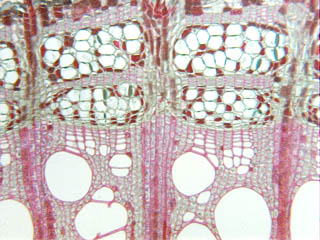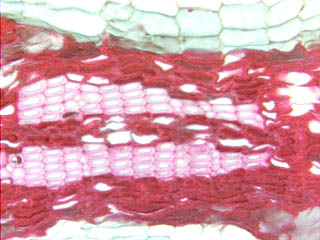 Fig.
16.2-6a and b. Transverse section of grape vine bark (Vitis).
The secondary phloem of grape is a little unusual in having very wide rays, well-demarcated masses of sieve tube members and
companion cells and prominent bands of fibers. Because the sieve tube
members form such a discrete mass, when they stop functioning and collapse, the
entire mass collapses (high magnification micrograph) – there are no
non-conducting parenchyma cells present to retain any volume. You can see that
after a few years, the accumulated secondary phloem provides good protection to
the stem: the old phloem consists of dead, collapsed sieve tube members mixed
with bands of dead thick-walled fibers. This would be quite a mess for any
animal to chew through.
Fig.
16.2-6a and b. Transverse section of grape vine bark (Vitis).
The secondary phloem of grape is a little unusual in having very wide rays, well-demarcated masses of sieve tube members and
companion cells and prominent bands of fibers. Because the sieve tube
members form such a discrete mass, when they stop functioning and collapse, the
entire mass collapses (high magnification micrograph) – there are no
non-conducting parenchyma cells present to retain any volume. You can see that
after a few years, the accumulated secondary phloem provides good protection to
the stem: the old phloem consists of dead, collapsed sieve tube members mixed
with bands of dead thick-walled fibers. This would be quite a mess for any
animal to chew through.